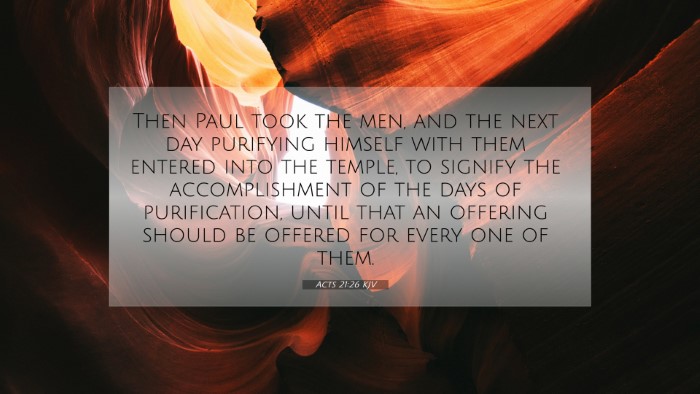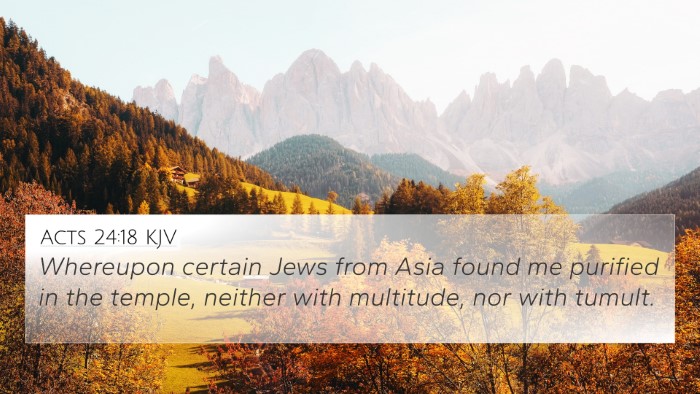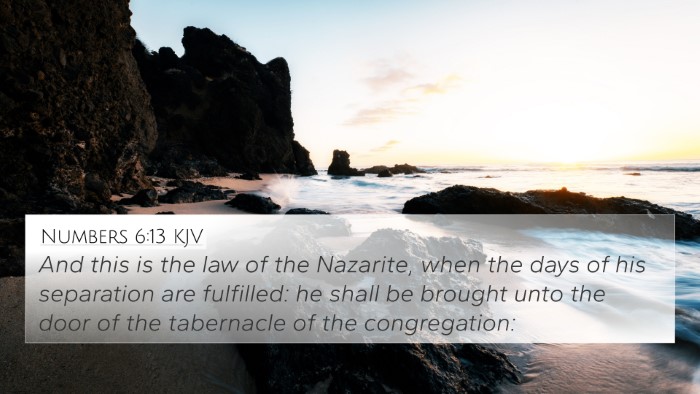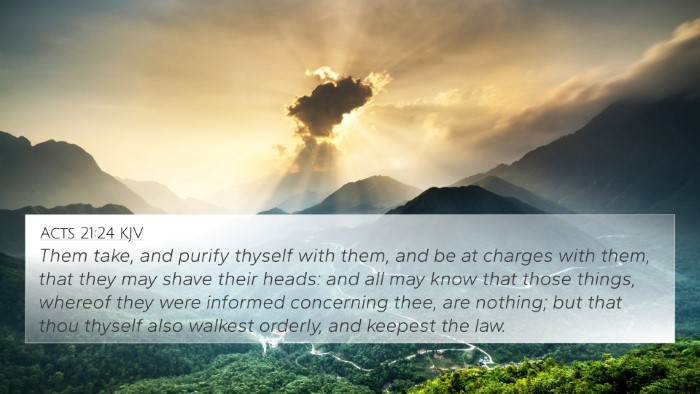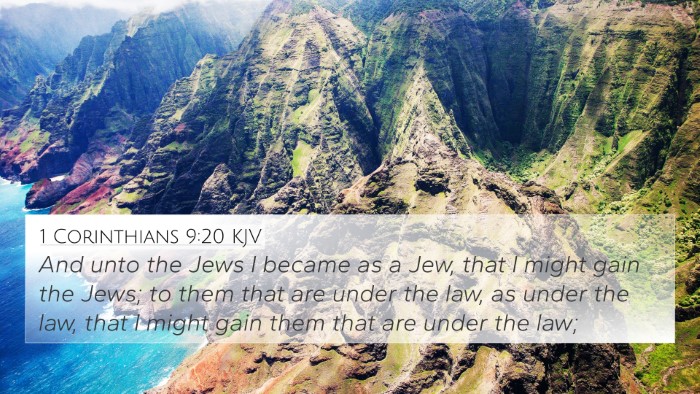Meaning of Acts 21:26
Acts 21:26 states: "Then Paul took the men, and the next day purifying himself with them entered into the temple, to signify the accomplishment of the days of purification, until that an offering should be offered for every one of them." This verse captures a pivotal moment in the Apostle Paul's ministry where he participates in Jewish purification rituals while in Jerusalem, highlighting both his respect for Jewish customs and his dedication to the Gospel.
Summary of Insights
The commentary by Matthew Henry emphasizes Paul's adherence to Jewish law as a demonstration of his commitment to peace among the Jewish believers. He did not abandon his cultural roots, which he maintains for the sake of unity in Christ.
Albert Barnes notes that Paul willingly engaged in these rituals to avoid causing offense to the Jewish community. His actions symbolize a broader theological point regarding the need for sensitivity to varying cultural practices within the Christian faith.
Adam Clarke elaborates on the significance of purification and offering, indicating that Paul's participation demonstrates an understanding that the law served its purpose but ultimately pointed to Christ. This commitment to unity illustrates the concept of cultural relevance in ministry.
Cross References
Several Bible verses connect with Acts 21:26, providing a broader understanding of its themes:
- Romans 14:1-3: Paul discusses the importance of accepting those strong in faith and not judging differing practices.
- 1 Corinthians 9:19-22: Paul outlines his strategy of becoming all things to all people to win souls for Christ.
- Galatians 2:3-5: Paul details the importance of maintaining the truth of the Gospel amidst differing cultural practices.
- Acts 15:1-29: The Jerusalem Council addresses issues of law and grace, establishing guidelines for Jewish and Gentile believers.
- Matthew 5:17-19: Jesus emphasizes fulfilling the law, which is reflected in Paul’s actions.
- 2 Corinthians 6:3-10: Paul speaks about his personal integrity and the importance of his testimony despite the challenges faced.
- James 1:27: Highlights the significance of caring for those in need, connecting with the communal aspects of religious practice.
- Colossians 2:16-17: Discusses the shadow of the law compared to the substance found in Christ.
- Acts 23:6-10: Further details Paul's strategic engagement with different groups regarding his beliefs.
- Philippians 3:5-6: Paul shares his own Jewish heritage, showing how he values his background even after coming to faith in Christ.
Thematic Connections
Acts 21:26 serves as a vital passage showcasing Paul navigating early Christian identity amidst Jewish cultural practices. Several themes emerge:
- Cultural Relevance: Paul's participation in Jewish customs while preaching the Gospel signifies the importance of cultural sensitivity in ministry.
- Faith and Works: While Paul preaches grace, he also shows an understanding that works—like purification—remain a meaningful aspect of certain practices.
- Unity in Diversity: The willingness to engage Jewish customs illustrates the call for unity in the body of Christ, regardless of differing backgrounds.
- Commitment to the Gospel: Paul’s actions highlight that he prioritized the advancement of the Gospel above personal preferences, which is a guiding principle for believers.
Understanding Through Cross-Referencing
Utilizing tools for Bible cross-referencing enhances the understanding of verses like Acts 21:26. Through inter-Biblical dialogue, one can uncover deeper insights:
- Using a Bible Concordance allows for easy identification of themes and related scriptures.
- A Cross-reference Bible Study can illuminate parallels between New Testament practices and Old Testament law.
- Applying a Bible Cross-reference Guide aids in systematic exploration of scriptural connections.
Conclusion
Acts 21:26 serves as a profound reminder of the delicate balance between cultural practices and spiritual truths. By interpreting this verse and considering its cross-references, we gain a comprehensive understanding of the importance of unity and the adaptability of the Gospel message in diverse contexts. Through these insights, believers are better equipped to engage in thoughtful, respectful dialogue about faith, culture, and community.


